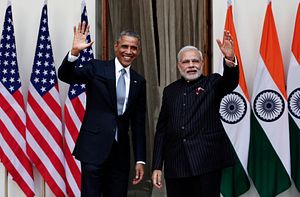This week, U.S. President Barack Obama made his second visit to India. As during his trip to China last year, where he signed a landmark agreement to reduce greenhouse gas emissions, climate change ranked near the top of the agenda. In New Delhi, the two governments jointly announced new initiatives to reduce India’s contribution to climate change and a breakthrough in a long-stalled agreement on nuclear power. It is striking that the climate issue, once a fringe concern in U.S. foreign policy circles, has become so central to two of America’s most important bilateral relationships. In part, this shift reflects the Administration’s genuine concern in preventing dangerous climate change. But putting climate change front and center in America’s relations with the world is also smart foreign policy. Over the next year, the Obama Administration should leverage this promise by making climate change the building block of America’s relationships not just with emerging powers like China and India, but with countries around the globe.
Obama’s climate diplomacy is first and foremost an attempt to bring Beijing and New Delhi on board in advance of crucial international climate negotiations set to take place in Paris at the end of this year. But the Administration’s focus on climate change offers new opportunities well beyond these talks. Long an important issue in the developed world, climate change has leapt to the top of the political agenda in developing countries as well. By reclaiming the leadership role that it effectively surrendered by refusing to ratify the Kyoto Protocol some fifteen years ago, the United States has a rare opportunity to simultaneously cement its relationships with emerging powers, address a critical threat to stability in fragile states, and position itself at the center of the low-carbon economy that can and will power prosperity for the rest of the twenty-first century.
A strategic focus on climate change in U.S. foreign policy should be built around three basic pillars. First, Washington must engage all countries with significant greenhouse gas emissions, which apart from China and India include Brazil and Indonesia, as well as countries that will suffer most from the effects of climate change, particularly Bangladesh and Central African nations. There is no one-size-fits all approach to such engagement, but priorities should be coordinating U.S. aid and technical assistance as well as linking sub-national entities like cities, universities and civil society groups to address climate issues at the local level, where they matter most. This kind of multi-level engagement adds depth to U.S. ties with developing countries, while addressing matters of fundamental mutual concern. The U.S. should also coordinate this activity with its European allies, many of which have significant experience in climate diplomacy.
Second, the United States must develop a strategy to break the nexus between climate change, resource scarcity, and conflict in fragile states. In areas like Yemen and the African Sahel, changes in the distribution and availability of water, both linked to climate change, have combined with weak governments to fuel conflict between social groups, and helped sustain militants. It is no accident that ISIS fighters have repeatedly seized Iraq’s large dams, or that Al Qaeda forces in Yemen consistently target water supply infrastructure – control the water, and you control the population. The U.S. must review its aid and security assistance programs to ensure it provides adequate support to partners and allies to adapt to water scarcity under climate change, and to prevent militants from exploiting it.
Third and finally, Washington must rapidly enhance cooperation with other nations on clean energy technologies. The U.S.-China Clean Energy Research Center, which funds joint research and development programs in both countries, should be replicated in countries like India and the United Arab Emirates, which is working to expand its renewable energy sources. At the same time, these initiatives can be tailored to promote the interests of U.S. businesses by incorporating public-private financing and applying intellectual property protections similar to those widely used in international university research collaborations.
Admittedly, this re-doubled focus on climate diplomacy would not sit well with some members of Congress. But foreign policy is a presidential prerogative, and making climate change central to U.S. diplomacy serves too many vital national interests to ignore. Let us hope that Obama’s climate diplomacy in New Delhi is a taste of things to come.
Scott Moore is an International Affairs Fellow at the Council on Foreign Relations, and studies global environmental issues.

































